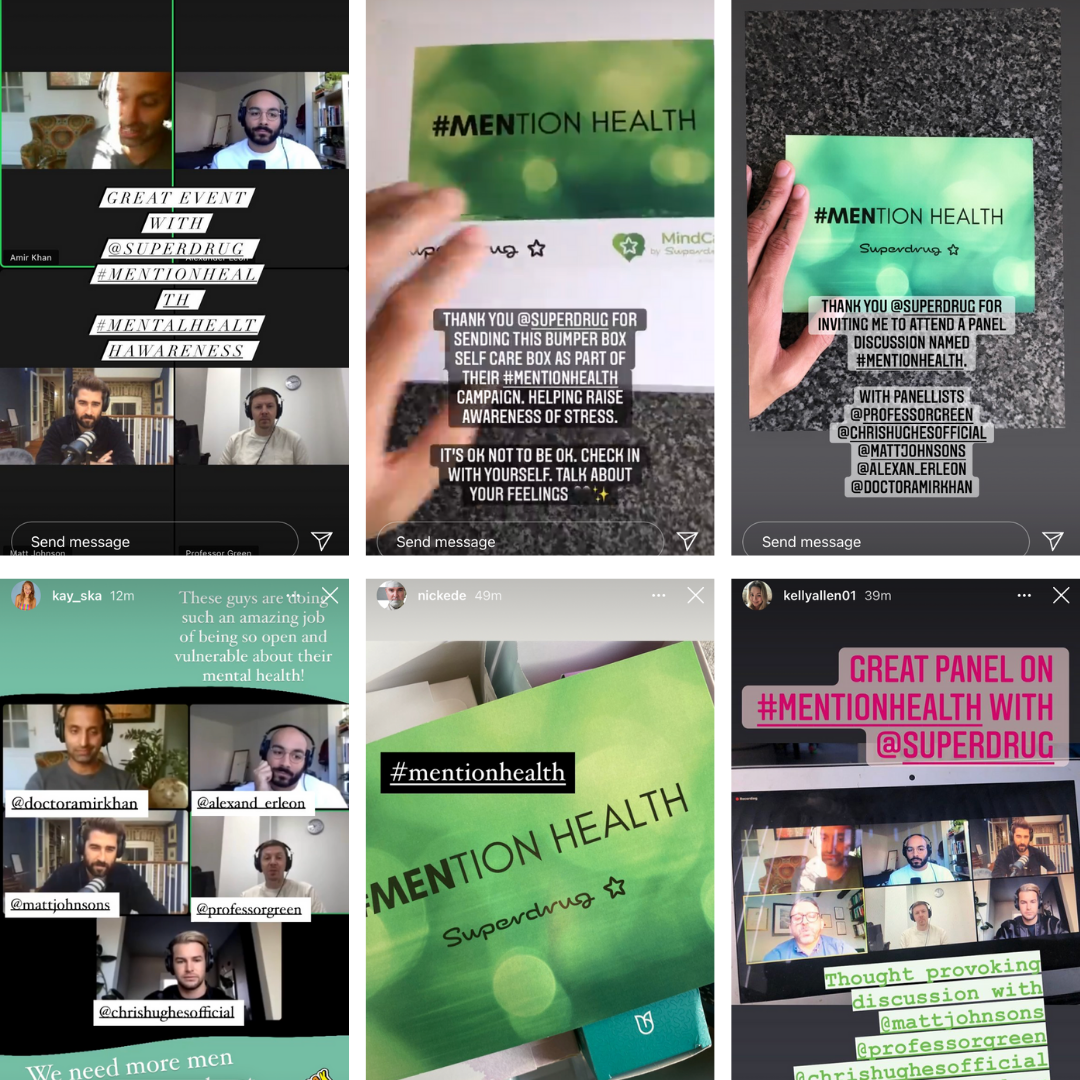What do you get if you arrange a panel discussion between a music producer and rapper, a former Love Island contestant, high profile diversity campaigner, a GP from Bradford and a Welsh television presenter? I’ll tell you: A very interesting and candid discussion about men’s mental health.

This random group of individuals was brought together by Superdrug as part of its #Mention Health campaign to raise awareness of men’s mental health issues.
The discussion was timed to coincide the recent National Stress Awareness Day, which was earlier this week on 4 November. The idea was to discuss the impact of lockdown on men’s mental health.
The event was partly inspired by research Superdrug recently undertook with almost 3,500 of its customers. Of those questioned, 86% said they thought men found it more difficult to discuss mental health issues than women.
So who were the panellists? They were: Rapper and music producer Professor Green (Stephen Manderson) who is also a patron of the Campaign to End Living Miserably (CALM), model and former Love Island contestant Chris Hughes, diversity campaigner Alexander Leon (who, like me, is a LinkedIn Changemaker) and GP and author Dr Amir Khan. The event which was hosted on Zoom, was chaired by Caerphilly’s finest Matt Johnson, a television presenter who made a documentary about the impact of depression on his life.
It is great to see an organisation like Superdrug enter the debate on men’s mental health. With two daughters, it’s certainly a retailer I am very familiar with, but it’s not a brand I would associate with commentating on mental health issues.
That was an introduction to the #MentionHealth panel discussion. Here’s an overview of what was said by the panellists.
Many interesting perspectives
Alexander Leon made some very interesting points about his background and how this impacted on him. To quote Alexander, he said: “I’m a gay man, a brown man” and growing up “I didn’t feel like I fitted in.” He added that 50% of individuals from the LGBT community have experienced depression, which is much higher than in the rest of the population.
Alexander also made some interesting points about masculinity, saying that men are pigeonholed at a young age and told how you’re meant to behave as a boy and a man. Growing up Alexander said he was always keen to play with girls, but this was not encouraged.
I had previously read about Professor Green’s mental health challenges and I’m very aware of the work of CALM. I thought he’d bring a great deal to the discussion and he didn’t disappoint.
He was incredibly open about his experiences living with anxiety since he was a boy. Green explained that he used to get stomach aches as a child, although it was years later that he finally realised they were caused by anxiety. This is a man who was raised by extended family and whose own father and uncle committed suicide. In his father’s case, Green had to identify the body after years of estrangement, so he has certainly seen and experienced things that would impact on anyone’s mental health.
Green also made the point that we’re all under pressure to be “happy.” He said we should aim to be “content,” which is more realistic.

As someone who doesn’t ‘do’ shows like Love Island, I had no idea what to expect of Chris Hughes. I thought he was engaging and enthusiastic.
Hughes spoke very openly about his own panic attacks and also touched on the issue of self-harm. While self-harming may be largely associated with women, Hughes stressed men do it as well and that it does not have to involve cutting. He said his own anxiety made him want to “scratch his own skin off” as opposed to cut himself.
Hughes was also a big advocate for getting outside and being active. That said, he also pointed out the new lockdown in England would be hard for some because it gets darker so much earlier and reduces the opportunities to get outside.
Hughes is another panellist I have something in common with. It transpires we’re both from the Cotswolds. It occurred to me afterwards that Hughes would have been well placed to discuss the challenges of living with mental health conditions in rural areas as there are distinct issues with gaining access to services in sparsely populated areas. That, however, is a discussion for another day.
Dr Amir Khan offered a more professional perspective. He acknowledged that access to mental health services can take far too long. He also said that during the COVID-19 crisis, he and colleagues had been under immense pressure, pressure that was sometimes hard to handle and this had “taken its toll” on him.
Khan also made a very astute point. He said mental health issues are often associated with women, but this is because women are more open about their experiences and therefore more likely to seek help and get a formal diagnosis. Men, meanwhile, are more reticent to seek help (ethnic minority men can can be even more reluctant to seek help, a point made by both Khan and Leon). This has created a situation where 75% of all suicide attempts are made by men.
Concluding comments
Asked to sum up the discussion, the panellists said mental health support needed to be more accessible and that the idea of having therapy should be normalised. They added that seeking help or therapy should be seen as a strength, not a weakness. The panel members also said men should check on their friends.
While it was good to see this panel discussion taking place, I have to make the one observation. There was no one on the panel to discuss the impact of lockdown on fathers’ mental health.
The lack of discussion about fathers was noticeable. It’s hard to imagine a discussion about women’s mental health not looking at the impact on mothers. A lot of men are fathers are there was a lot that could have been discussed; from rapid and enforced homeworking, the stresses of homeschooling kids, the issues separated and divorced fathers have had seeing their children during lockdown, not to mention worries about being furloughed or being made redundant (those last two issues weighing particularly heavily on fathers in general as most men are also the main earners in their households).
Increasing presence in mental health
Despite that one observation, it was good to see this discussion taking place. The panel were very engaging and was very interesting hearing what they had to say.
It’s also worth noting Superdrug will soon be launching an online mental health consultation service called Mindcare. This certainly suggests Superdrug will be taking further steps to establish itself as both a mental health service provider and commentator on these issues.
The panel discussion will be made available as podcast. I will share the links on my social media channels once it is available.







2 thoughts on “#MentionHealth: men’s mental health Campaign”
A great read John. Fab to see mens mental health being supported and pushed for change.
I have difficulty sometimes with depression and anxiety and with sharing I hope it will help others know its ok to feel this way, to seek help and speak more openly about how they feel.
I wasn’t aware of this campaign but I am going to follow it.
I had seen some of your posts where you speak out on these issues. Great that you do as we can only end stigma by speaking out. Expect an update on #MENtionHealth in early December Eddie.